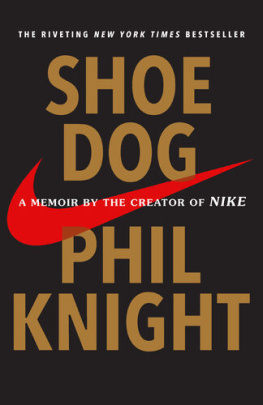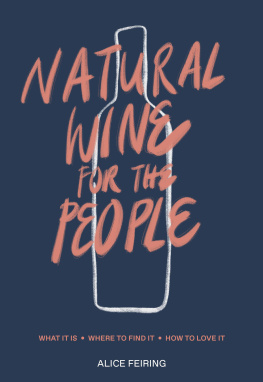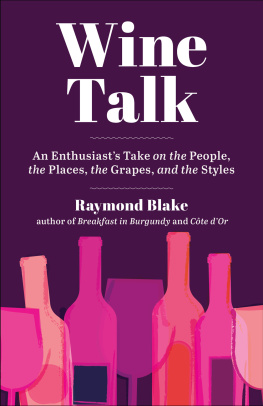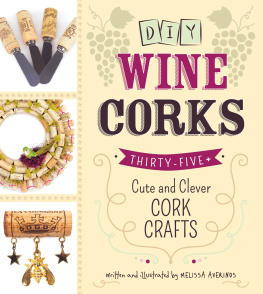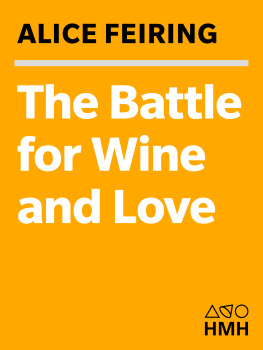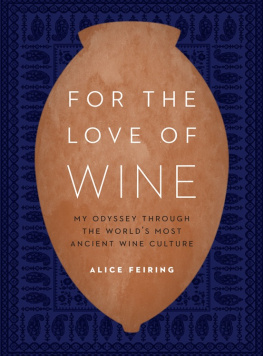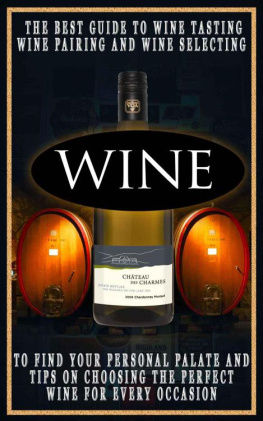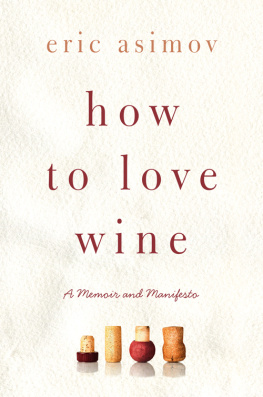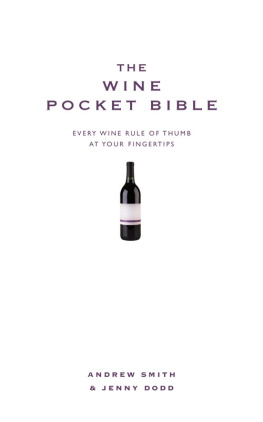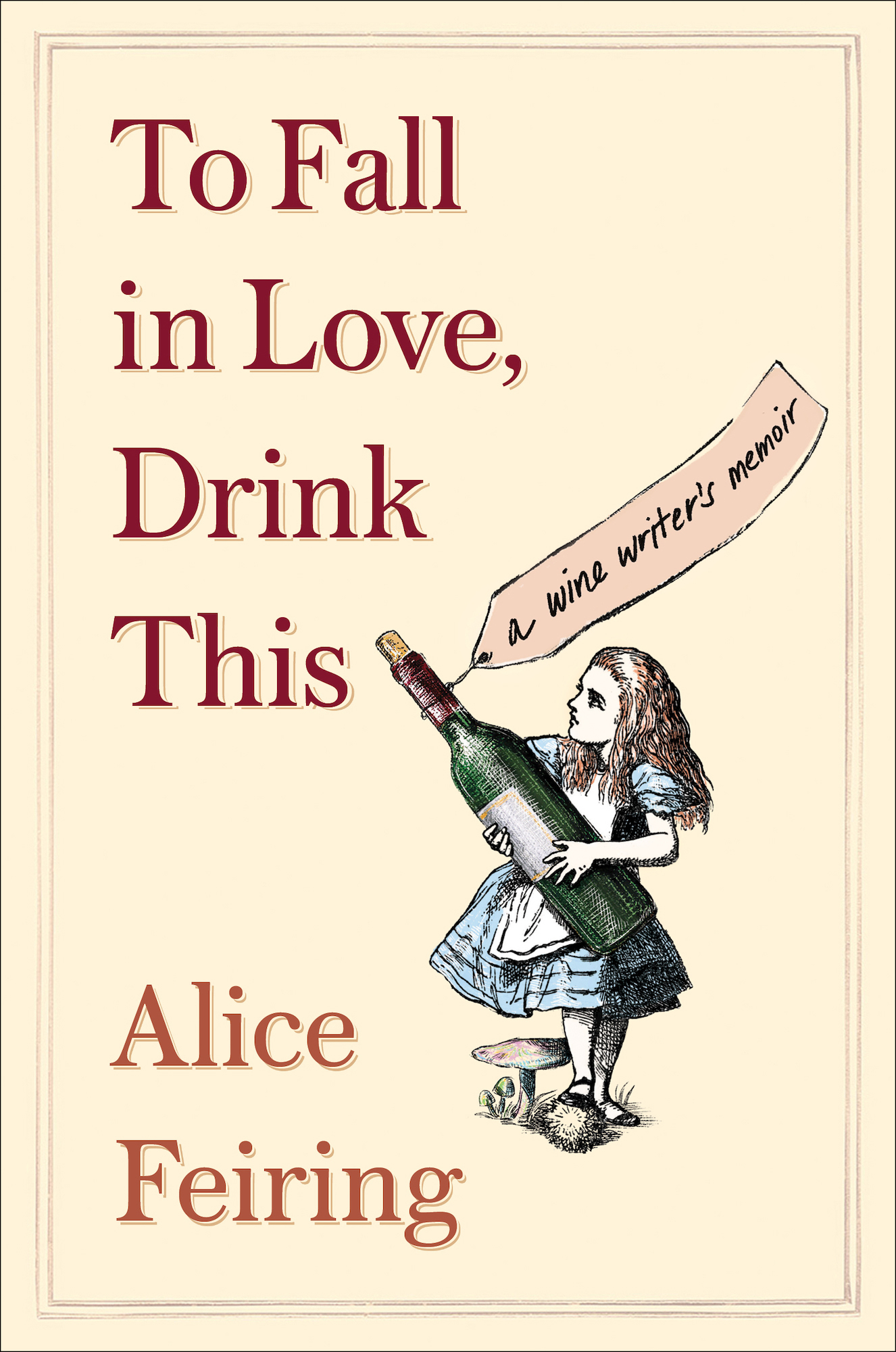Contents
Guide
To Fall in Love, Drink This
A Wine Writers Memoir
Alice Feiring
For Becky Wasserman-Hone
Introduction
M y ninety-eight-year-old mother never seems to stop asking me, This is what you do for a living? Tell people what to drink?
God knows Ive tried to explain to her what kind of work I do. Ethel, Ill say, while theres nothing wrong with being a wine critic, thats not my job. And then Ill go on and on about mysticism and metaphor. I think the last time I tried that, she just laughed.
How can I explain to her, a person who understands only sweet, cheap kosher wine, that my trajectory has been not so much to direct wine lovers to life-changing bottles but to expose the industrys abuses and to explore understanding wines spiritual underpinnings? I mean, what was this fermented grape juice all about? When I think of it, which I often do, I stand head bent in awe. When attacked by the Turks, Georgian soldiers went into battle with a vine clipping near their breast; should they die on the field, a grapevine would take root through their heart. Even if that story was nothing more than local mythology, the love behind the myth begs for attention: Why have cultures lived and died for the right to farm, make, and drink wine? Why does almost every culture have a relationship to wine? Why do people like me continue to ponder it, obsess about it, drink it, write about it? One writes to figure out the truth. Wine is the metaphor that I never cease to find meaning in.
The wine odds were against me. If you ask Ethel (go ahead, look up Jewish mother in the dictionary, youll see her name right there), I was supposed to be a doctor like my brother or, even better, marry one. To quote Mom when she first visited my lopsided railroad apartment, Didnt I bring you up to live in a doorman buildingor at least have indoor plumbing? Well, she was wrong; I had a water closet in my living room and a bathtub in my kitchen. All indoor. But even I wonder how an introverted yeshiva girl from a family who couldnt tell a merlot from a Manischewitz survived, and eventually flourished, as a wine writer.
Survival often hinges on the back of accidents, luck, and the random kindness of strangers. When I was growing up, my salvation was losing myself in books and a whirlwind of mostly self-taught arts. My embarrassingly depressive poems were published in yearbooks. Even though Id later hear that Isaac Bashevis Singer was actually family, being a writer seemed unobtainable, to reach for it delusional. But something strange happened when I was punching out my masters thesis (dance therapy) on the therapeutic aspects of Morris dancing. Once I began to write again, I couldnt stop. I purchased a bulky IBM Selectric. The poetry of my youth shifted to fiction, plays, and essays, and I locked myself in my apartment, battled with my inadequate spelling and worse grammar, and produced until I had the nerve to stuff pages along with that enclosed self-addressed envelope into the mailbox. My first published prose piece, in a local indie newspaper, was about a blind date and how, as nice as he was, I couldnt get past his Irish Spring soap.
Other writers warned me that should I pursue my dream, what lay in front of me was abject poverty and scathing rejection. My mother was certain that I would be forever a bum. I felt that if I didnt commit myself to what I knew I had to, Id go through life feeling as if I had a cat clawed into my chest. There was no choice and I took my chances. I returned from my decade-long stay in Boston to New York in order to give the writing life a shot. Wine was merely one of my subjects. Food, design, and architecture were the others.
For a good decade, I was just like any other aspiring writer. My collection of short stories sat in a drawer. Skin Burns, a three-act, went up in tiny black-box theaters. Home Cooking got a reading at Manhattan Theatre Club. Nothing stuck. I looked for love. I found it. Lost it. Found it again. I creaked along. Workwise, the business section of the New York Times was my big fish.
Then one day I received a call from a friend.
Psst, Alice, he said. Theres a guy out here in Napa whos helping wineries craft their wine so Robert Parker will give them a hundred points as a score.
I was stunned at firsthow cynical was this world? Then curiosity took overwhat technologies were in place to allow crafting wine to someones taste buds? I was off to hunt the story. In 2001, for the New York Times biz section, I wrote that piece on technology in the wine industry, and all of a sudden I was a controversial figure. My more mainstream editors banished me as too hot to handlethey might lose advertising if they ran stories about truly artisanal wine. Napa and Big Wines reactions? You can imagine.
I was confused. All I was doing was reporting; how was that polarizing? At the time, I didnt see myself as a whistleblower. Yet I was in the grips of something bigger than myself. I discovered natural wine. This category was delicious, bursting with life, and made from organic grapes and none of the seventy-two-plus legal additives or with any of the technologies I had ranted about. I spent time in vineyards, I learned about viticulture and chemistry. My world exploded with travel and discovery. It was wild, energetic, and idealistic.
Like the ivory-billed woodpecker, I saw that the traditional wines of the world were endangered, and no one was saying anything about it. My more established and esteemed colleagues complained behind closed doors, but not one of them spoke up in print about the tarted-up bombastic wines that so charmed the great critic, hed give them scores of 95 to 100 points on his subjective scale, delivering the producers to fame and fortune. Robert Parker, the Emperor of Wine, was that powerful.
How could I remain silent as well? I couldnt, and using my Word program as my sword, I wrote The Battle for Wine and Love: Or How I Saved the World from Parkerization. That book won me many fans and just as many enemies. There were those who applauded, but public figures remained closeted, like the prominent Bay Area wine importer who told me he couldnt give me a book blurb because Parker still reviewed the wines he sold, and he just couldnt risk it.
My book helped break the silence. Today the wine scene is completely different. The new generation has little idea who Robert Parker, Jr., is and what he meant to the wine drinkers of the world. Wine is coming back to its baseline. Natural as a category is celebrated. Organic farming is on the rise. There is no one all-powerful voice. At least when it comes to the spectrum of wine, we are living in a cornucopia period of diversity. I had plenty of time to think about all of this at the beginning of the pandemic of 2020, when many of us feared the wine shops would close.
I was quick to stock up on selections to keep the glasses full for me and my partner. But when he abandoned me to shelter at his place, where he had his toys, I found that the wines supposed to shoulder me through were failing me. In the dramatic stillness, the masked days, and the gauze-covered time, everything tasted off. Bitter, fruity, or savory, on my own with no one to clink with night after night after night that almost promised never to end, the tastes fell flat.
The essay about my experience landed in New York magazine. That piece wasnt about wine, thoughit was about loneliness, the need for discussion and touch. Wine is the place where history, science, and civilization meet, and drinking the right glass of wine does have the power to nourish love. The essay hit a nerve and illuminated what I already knew. I write about wine because it is life.

